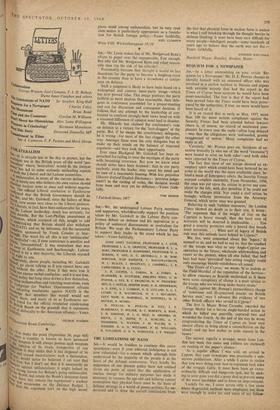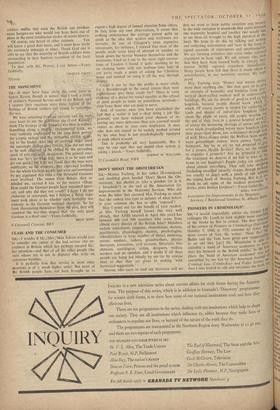REQUIEM FOR A 'NEWSPAPER
a letter commenting on your article 'Re- quiem for a Newspaper,' Mr. D. E. Provan chooses to identify himself with an unnamed officer who was involved in a curfew incident in Nicosia and argues with extreme naivety that had the report in the Times of Cyprus been accurate he would have been court-martialled. The fact is that if the report had been proved false the Times could have been prose- cuted by the authorities; if true, no more would have been heard of it.
It is on record that as early as May, 1957, more than 100 far more serious complaints against the Security Forces had been attested before lawyers (there is, of course, no record of unattested com- plaints). In every case the reply—often long delayed —was that the allegations were 'unfounded, grossly exaggerated or untrue' Many complaints had no reply at all.
'Certainly,' Mr. Provan goes on, 'incidents of ex- cessive brutality [a nice use of the word "excessive") were bound to arise on both sides'—and both sides were reported by the Times of Cyprus.
The fact that most of our troops showed an ex- emplary spirit which could have been bettered by no army in the world was the more creditable since, be- hind a mesh of Emergency edicts, the Security Forces enjoyed complete immunity. From November, 1956, the onus was put upon the citizen to prove any com- plaint to the hilt, with dire penalties if he could not make the charges stick. Nor could a civil action be brought without permission from the Attorney- General, which never once was granted.
Referring to such 'ruthless measures,' the London
Times showed no doubt as to their aim. It wrote: 'The argument that if the weight of fear on the Cypriots is heavy enough, then the hard core of terrorists will be deserted is implausible. . . . Too great a severity promotes only a hatred that breeds more terrorism. . . . What sort of legacy of British rule may this attitude leave behind in Cyprus?'
We, too, were concerned about this 'legacy.' It
seemed to us, and we had to say so, that the conduct of the troops was vital to any Anglo-Cypriot co- operation in the future; wholesale whitewashing and resort to the pretext, when all else failed, that bad' hats had been 'provoked' into acting roughly could only encourage bloody-mindedness all round.
'The Vines of Cyprus,' we wrote, 'is as jealous as
the Field-Marshal of the reputation of the Services: to allow rumours to flourish unchecked as if there were some conspiracy of silence is a poor service to the troops who are working under heavy strain.'
Finally, against Mr. Provan's extraordinary charge of `consistent and ill-conceived attacks on British Service men,' may I advance the evidence of two other British officers who served in Cyprus?
The first is Major Brian Coombe, awarded the
George Medal for a heroic single-handed action in which he killed one guerrilla, captured two and wounded the fourth. At the end of his stay he wrote congratulating the Times of Cyprus on 'your very sincere efforts to bring about a reconciliation on the
island—and my best wishes to your success in the future.'
The second. equally a stranger, wrote from Lon- don last week (his name and address are enclosed) on reading of the paper's closure:
'As a regular officer 1 was told, on arrival in Cyprus, that your newspaper was practically a sub- versive publication. After a while I came to realise that you were doing your best to represent both sides of the struggle fairly. It must have been an extra- ordinarily difficult and dangerous task, but by stick- ing to your guns you did a great deal to prevent some of the worst hardships and to force an improvement.
`Luckily for me. I came across only a few cases where disgraceful methods were employed, but these were enough to make me and some of my fellow- soldiers realise that even the British can produce some hangers-on who would not have been out of place in the most totalitarian circles of recent history.
'Of course, one heard of other excesses. . .. You will know a great deal more, and it must have made life extremely unhappy at times. Thank God one is able to say that the majority of British soldiers were outstanding in their humane treatment of the local population.'
To that, with Mr. Provan. I say Amen.—Yours faithfully,







































 Previous page
Previous page